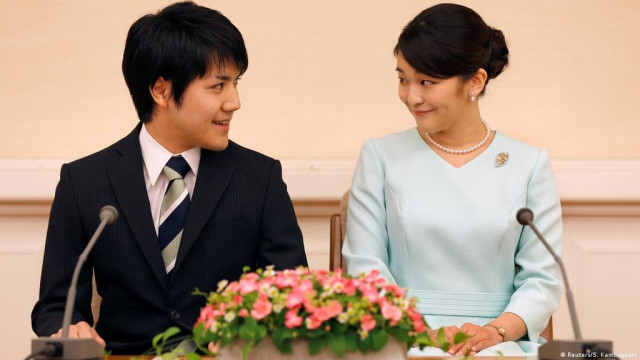Japan Royal gives up title, marries university sweetheart
Princess Mako gave up her royal title as she wed Kei Komuro, who is the same age and works for a US law firm

Japan's Princess Mako married her university sweetheart on Tuesday, but it was a low-key union bereft of traditional rituals, with the couple voicing sadness over the controversy that haunted their engagement.
Under the rules of the imperial family, Emperor Naruhito's 30-year-old niece Mako gave up her royal title as she wed Kei Komuro, who is the same age and works for a US law firm.
Japan's Princess Mako has officially left the Imperial household and is now a commoner. She married her former college classmate Komuro Kei on Tuesday. pic.twitter.com/GmJadkeuDn
— NHK WORLD News (@NHKWORLD_News) October 26, 2021
"To me, Kei is irreplaceable. Our marriage is a necessary step for us to be able to protect our hearts," she told reporters after the marriage was registered. I have been scared, feeling sadness and pain whenever one-sided rumours turn into groundless stories," she added as the newlyweds readout rehearsed statements in a soberly decorated hotel function room.
Since announcing their engagement in 2017, the couple has faced tabloid scandals and vicious online sniping over allegations that Komuro's family had run into financial difficulties.
After much delay, they finally tied the knot with no wedding ceremony, reception banquet or any of the usual rites - opting to do so privately, away from a public that has not always been kind.
Mako also turned down a large payment usually offered to royal women on their departure, reportedly up to 153 million yen ($1.35 million), and they are now said to be planning a move to the United States.
Royals are held to exacting standards in Japan, and Mako has developed complex post-traumatic stress disorder because of the media attention, according to the Imperial Household Agency.
"I love Mako. We only get one life, and I want us to spend it with the one we love," Komuro said. "I feel very sad that Mako has been in a bad condition, mentally and physically, because of the false accusations."
The couple did not answer questions from reporters verbally, to make the experience less stressful for Mako, the household said. But in a document given to reporters, she said her condition was "not good".
'Regrettable' situation
Women in the imperial family cannot ascend the Chrysanthemum Throne and lose their royal status when they marry a commoner.
TV footage showed the princess bid farewell to her family on Tuesday morning, bowing to her mother and father, Crown Prince Akishino, and hugging her sister.
Despite the negative press coverage and small but angry protests against the marriage, more than half of respondents in a survey by the Yomiuri Shimbun daily said they thought it was a good thing.
"The most important thing is that she is happy," Tokyo resident Machiko Yoshimoto, in her 60s, told AFP. "It would have been better to have a festive atmosphere, instead of this difficult situation, which is rather sad and regrettable," said Shigehiro Hashimoto, 54.
While Japanese media initially fawned over Komuro, reports soon emerged that his mother had failed to repay a four-million-yen loan from a former fiance.
As pressure grew on the couple, the wedding was postponed and Komuro moved to New York for law school in 2018, a move seen as a bid to defuse negative attention.
Mako said on Tuesday she had encouraged Komuro to "establish a life overseas".
Their reported plan to move to the US, where Komuro works, has drawn inevitable comparisons with another royal couple who faced a media onslaught: Britain's Prince Harry and Meghan Markle. It is not clear if Mako will work, but she is well qualified, having studied art and cultural heritage at Tokyo's International Christian University. She also holds a Master's degree from the Britain's University of Leicester.
The Japanese throne can pass only to male members of the family, and the children of female royals who marry commoners are not included. There has been some debate over changing the rules, and a government panel in July compiled notes on the issue including a proposal that royal women stay in the family, even after marriage.
Although polls show the public broadly support women being allowed to rule, any change is likely to be slow, with traditionalists vehemently opposed.
Have something to add to the story? Share it in the comments below.





-(1)1720859193-0/Untitled-design-(83)-(1)1720859193-0-208x130.webp)












COMMENTS
Comments are moderated and generally will be posted if they are on-topic and not abusive.
For more information, please see our Comments FAQ